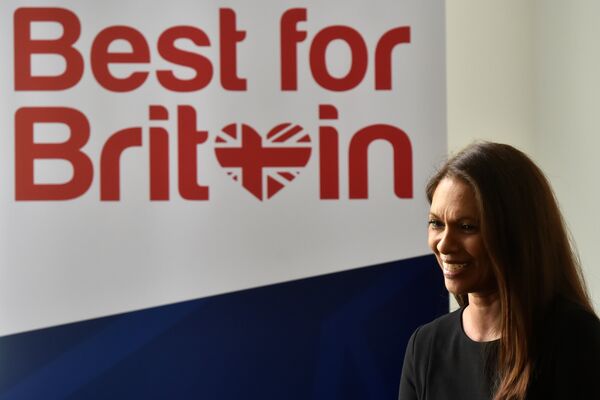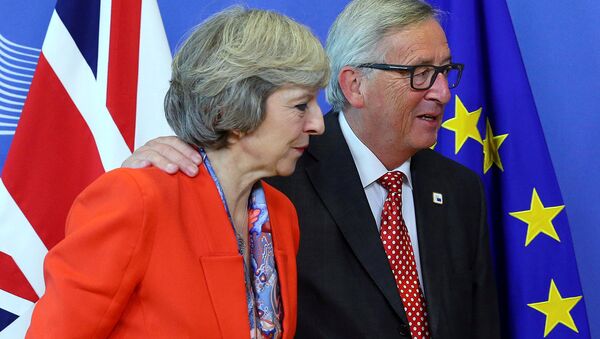In the 2017 general election, Brexit was seemingly the dog that didn't bark. While Theresa May avowedly went to the polls to strengthen the UK's hand in secession negotiations with Brussels — and the election itself was initially billed by some commentators as the "Brexit election" — the seismic issue was barely discussed by either main party, and was largely absent from mainstream media reporting on the campaign.
Labour is now the most trusted party to lead the Brexit negotiations amongst Remain voters #ge2017 https://t.co/9JNodmfO0N pic.twitter.com/wWNOpnCmbe
— Opinium Research (@OpiniumResearch) June 6, 2017
Labour's position was pithy, and light on detail — while the party was committed to leaving the European Union inside government or out, it would push for a "strong emphasis" on the country remaining in the single market and customs union, and protecting workers' rights. How this would be achieved, and what this would entail — particularly given EU leaders have repeatedly made clear single market membership is inextricably linked to membership — was left unexplained.
The Conservative stance was somehow even more scant on specifics — May merely claimed she was suitably strong and stable to lead negotiations with bloc leaders, while Jeremy Corbyn wasn't, a view many voters didn't share.
THANK YOU! We've increased our number of MPs by 50% and voters have rejected Theresa May's plans for an extreme Brexit. #brighterfuture pic.twitter.com/CCjMIVwaHa
— Liberal Democrats (@LibDems) June 9, 2017
Only the Liberal Democrats placed Brexit at the core of their campaign, pledging to hold another referendum on the subject in the hope secession could be blocked — and that the party itself might seduce the disenfranchised 48 percent of voters who voted to remain in the EU in June 2016. However, this singular focus had negligible impact on their standing in the polls, and in the election itself the party gained a mere four seats — while losing Sheffield Hallam, the constituency of former leader Nick Clegg, one of the most impassioned anti-Brexit voices in the party.
Nonetheless, some believe Brexit did indeed play a pivotal role in the election — and May's approach to the issue could have been crucial in denying the Conservatives a majority.

Gina Miller, the campaigner who fought a successful battle against the UK government over Brexit in the Supreme Court and raised hundreds of thousands to support pro-European candidates in the general election, is among them.
Wow. So good Labour stronger. So good Brutal Brexit rejected. So good next generation realized the stakes and spoke up.
— David Miliband (@DMiliband) June 9, 2017
"Brexit was uppermost in many voters' minds, particularly young people. Early figures suggest up to 72 percent of 18-24 year olds voted in this election, and for a lot of them, it was a one issue campaign. I'm very proud to say my campaign played a role in convincing around a million young people, and 200,000 women, to register to vote. This is a clear rejection of the government's Hard Brexit strategy," Ms. Miller told Sputnik.
Lib Dem candidate for Maidenhead Tony Hill canvassing with Gina Miller and @BestForBritain in Maidenhead today. pic.twitter.com/LoVjkjcxxS
— James Hockaday (@JamesHockadayBM) June 3, 2017
While political parties may not have been talking about Brexit, campaigns such as Ms. Miller's certainly were, and visiting voters on their doorsteps to discuss their concerns, fears and hopes about the process into the bargain. She believes the failure of the Conservatives to do the same may well have been May's undoing. Underlining how Brexit was indeed a fundamental issue for voters, her campaign's tactical voting website, which offered guidance on who to vote for in which constituency in order to prevent a "hard" Brexit, attracted over half a million unique visitors.
Such a figure further demonstrates the falsity of YouGov's findings in May that a new voter demographic — dubbed "re-leavers" by the polling firm — had asserted itself in the UK.
"Re-leavers" were, YouGov claimed, individuals who voted to remain, but had come to accept it was too late to turn back, and wouldn't vote according to their Brexit stance. It suggested at least 23 percent of the British public fell into this category, leaving a total 68 percent of voters behind Brexit, or at least comfortable with the prospect. For Ms. Miller, the election result makes clear such claims were "never true."
#ReLeavers and Students by https://t.co/7cpufbXFPl stop this Tory #Brexit and make renting a home more secure #GeneralElection
— Coalition of Chaos? (@CoalitionOHope) June 8, 2017
"The idea people just decided to give in and get behind Brexit is clearly nonsense, a fantasy perpetuated by the right-wing media. In any event, opposition to Brexit needn't be about stopping it outright, but stopping a 'hard' Brexit," Ms. Miller said.
While the election result has arguably thrown the UK into turmoil in many areas, Ms. Miller believes it could have a positive impact on negotiations, making them more "flexible" — now, there's a much better chance of negotiations being a "reasonable, pragmatic" process.
"I know many in Brussels couldn't understand May's stance on Brexit at all. The result doesn't weaken the UK's hand in negotiations at all — and, in fact, it might mean it's not just the Tories negotiating Brexit. I've long said the best way to negotiate our withdrawal would be via an all-party committee, including representatives from parties in every region of the UK. This is such a big issue, it can't just be the Conservatives at the table," she concluded.


